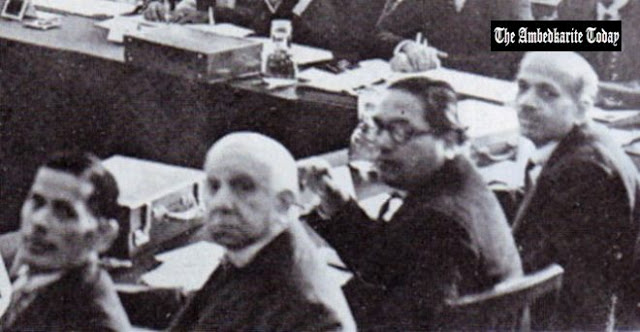Dr B.R.Ambedkar and their demands in First Round Table Conference
The First Round Table Conference officially inaugurated by His Majesty George V on November 12, 1930 in Royal Gallery House of Lords at London and chaired by the Prime Minister. Ramsay MacDonald was also chairman of a subcommittee on minority representation, while for the duration his son, Malcom Macdonald performed liaison tasks with Lord Sankey’s constitutional committee.
Dr Ambedkar, during his presentation in 1931 round table conference, described the Indian society as divided in three distinct sections — Hindus, Muslims and the depressed classes. He further stated that India can be truly independent only if these classes elect their own representatives for taking part in the process of government. Dr Ambedkar, thus, juxtaposed the class concept on caste division in India and broadly categorized SC/ST as depressed class, as almost all of them are in the same economic and social situation.
He, therefore, demanded and got separate electorate for the depressed classes in 1930s. Unfortunately, later on, separate electorate could not be incorporated in the Indian constitution. Dr Ambedkar being chairman of drafting committee of constitution, could not demand for separate electorate again, in light of division of the country and also because he had earlier signed the Poona Pact under pressure. Because of this typical historical situation, representation of SC/ST was sought to be achieved through the now failed and practically unworkable concept of reserved constituencies.
Background
- There were increasing demands of granting dominion status to India among a certain section of the British polity.
- In India, the freedom movement was in full swing with its demand for swaraj or self-rule spearheaded by the charismatic Gandhi.
- The conferences were based on the recommendation of Muhammad Ali Jinnah to Lord Irwin, the then Viceroy of India and James Ramsay MacDonald, the then British Prime Minister, and the Simon Commission report.
- It was for the first time that the Indians and the British were meeting as ‘equals’. The first conference started on November 12th, 1930.
Participants in the First Round Table Conference
- 58 political leaders from British India.
- 16 delegates from the native princely states.
- 16 delegates from the three British political parties.
- The Indian National Congress decided not to participate in the conference. Many of the INC leaders were imprisoned due to their involvement in the civil disobedience movement.
- Among the British-Indians, the following representatives attended the conference: Muslim League, Hindus, Justice Party, Sikhs, liberals, Parsis, Christians, Anglo-Indians, Europeans, landlords, labour, women, universities, Sindh, Burma, other provinces, and the representatives from the Government of India.
Issues discussed in the First Round Table Conference
- Dr B R Ambedkar demanded separate electorates for the ‘untouchables’.
- Federal structure
- Provincial constitution
- Provinces of Sindh and NWFP
- Minorities
- Defence services
- Franchise
- Executive responsibility to the legislature
- Tej Bahadur Sapru moved the idea of an All-India Federation. This was supported by the Muslim League. The princely states also supported this on the condition that their internal sovereignty is maintained.
Effects of the First Round Table Conference
- The First Round Table Conference lasted till 19th January 1931.
- Although many principles on reforms were agreed upon, not much was implemented and the Congress Party carried on its civil disobedience. The Conference was regarded as a failure.
- The British government understood the importance and the need for the Congress Party to make any decision on India’s political future.

